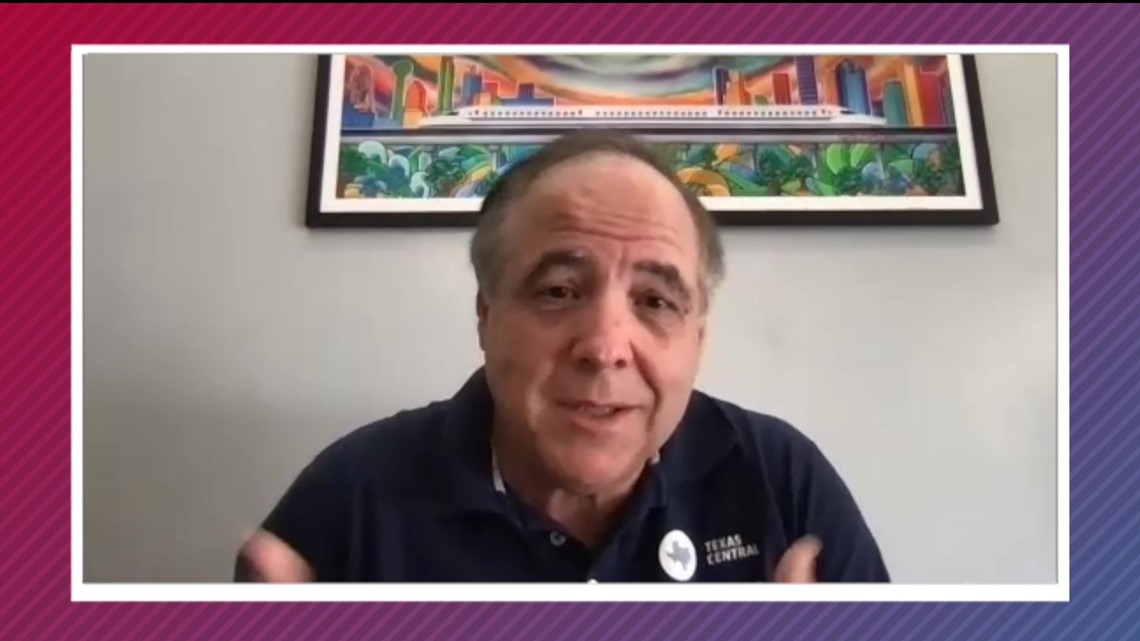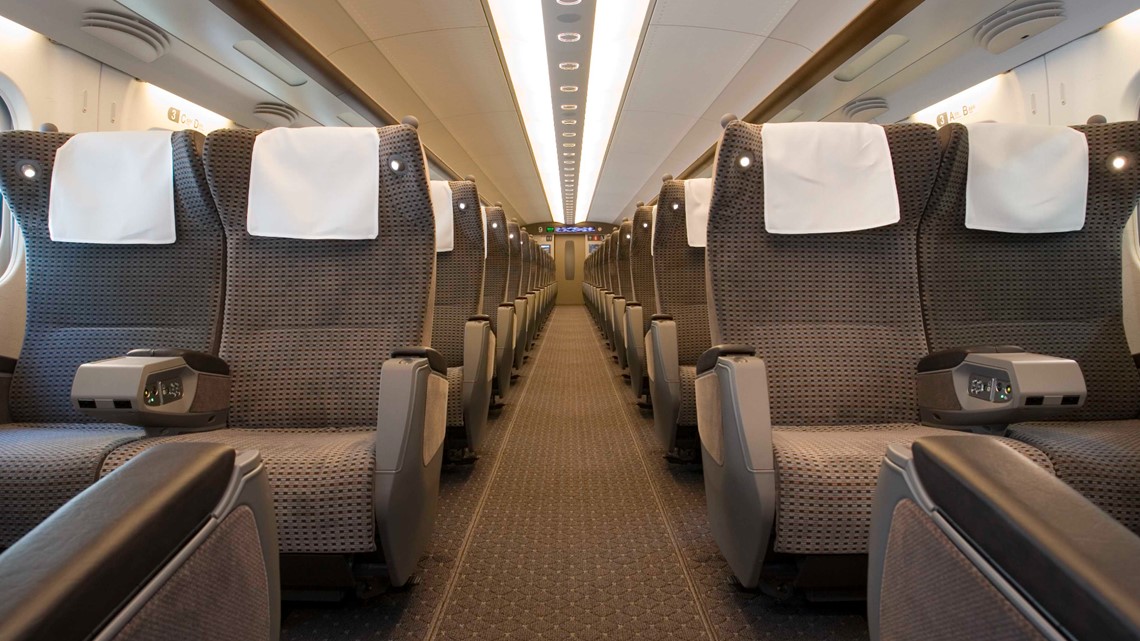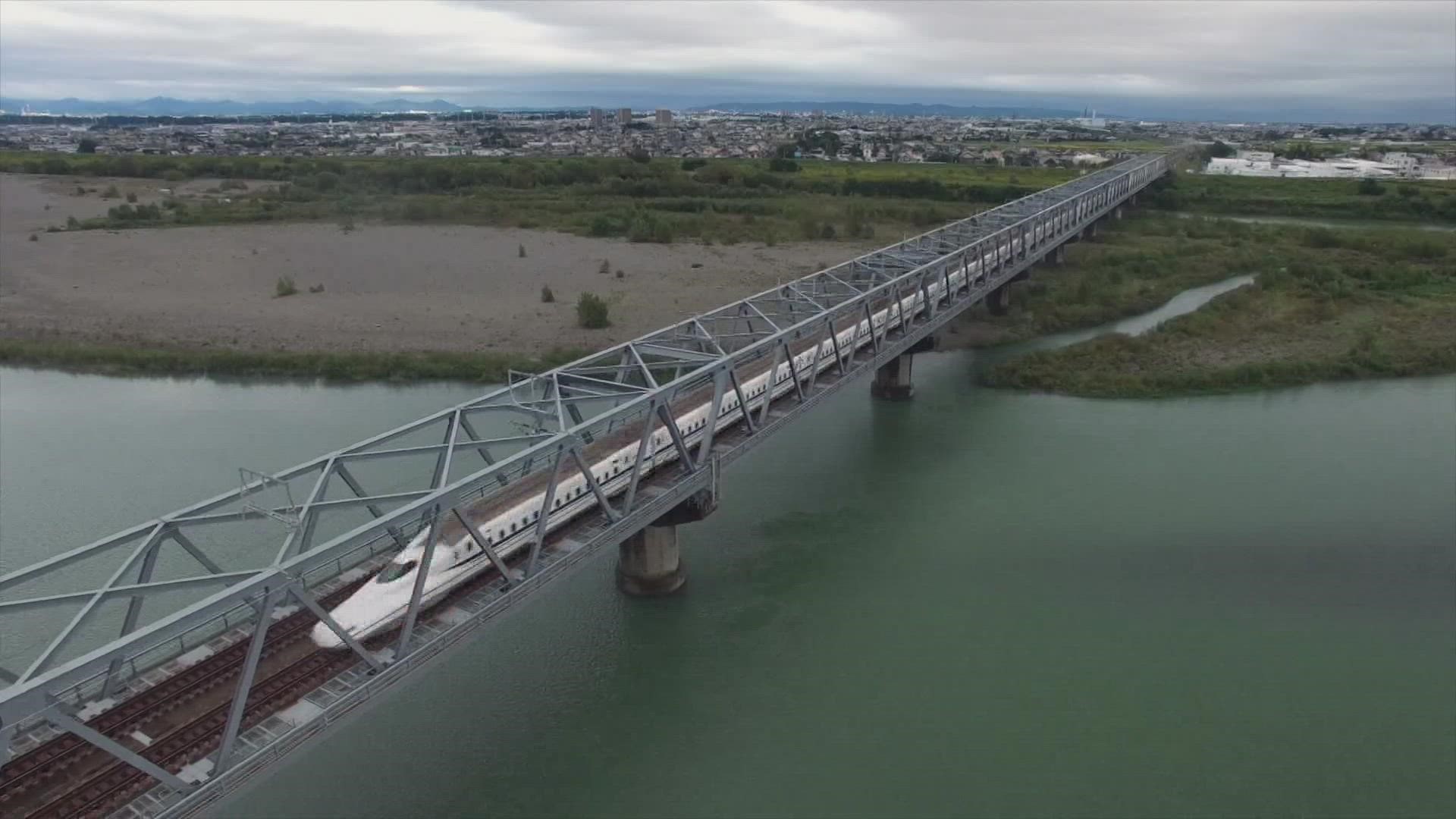DALLAS — The bipartisan infrastructure bill in Congress, set to be voted on later this month, will be key to completing the Texas bullet train, according to its CEO.
“I think whatever happens with the infrastructure [bill] is key to us. I believe that would be the final element that would bring us together,” said Carlos Aguilar, the CEO of Texas Central, the company building the bullet train, in the latest episode of the Y’all-itics political podcast.
Texas Central, which maintains that it will be entirely privately funded, will not ask for a federal grant or any tax money to begin the project, Aguilar said. Instead, he explained, the bipartisan infrastructure bill is expected to create low-interest, long-term loans for major infrastructure projects like the train.
“Our target has always been loans,” Aguilar added on the podcast. “It is focused, as I said on the long-term debt that is available through, for example, the RRIF program out of the U.S. Department of Transportation. And that's what you need to build large infrastructure.”


But how much money does Texas Central need to borrow from the federal government to begin building?
“How much it is or end up ends up being I cannot say precisely,” Aguilar explained, “our current estimate is around $12-billion. But it could be more. It is in that range.”
Texas Central has already secured letters of intent from banks in Japan and Europe, the railroad said.
But that $12-billion in loans from the infrastructure bill makes up about half of the remaining funding that’s necessary.
“The hard cost of this is about $24 billion. That is the cost of building this, setting it up and doing the start-up, installing all the equipment, and ensuring that you can get to commercial operations,” Aguilar continued.
When will construction begin?
For months, Texas Central has publicly stated that construction is projected to begin at the end of 2021 or beginning of 2022. But Aguilar said that timeline remains fluid.
“Well, it all depends on funding. You know, that's the real item that we're working on now. All the major items that we need to support the execution phase are in place,” he explained.
Even if the infrastructure bill passes this month creating long-term loans for Texas Central, is it possible that construction on the bullet train could still begin in the next six months?
“It is ambitious,” Aguilar said. “I think it's very optimistic to think that we would be turning dirt in six months, but again, we are having interest from private funds… so again, it's possible I cannot give you more than a 50% chance.”
How much will tickets cost?
For the first time, Aguilar also revealed how much a ticket on the Texas bullet train might cost.
“We're at about 75% of what air travel costs, that is more or less where price point is,” Aguilar said.
So how much is that?
Southwest Airlines charges $205 to fly between Dallas and Houston on an “Anytime” fare with a week’s notice, according to a check of its website.
That means a seat on the bullet train – at about 75% the cost of airfare – might be about $153.
Like airlines, Texas Central will have dynamic pricing which fluctuates during peak times. But the train has many more seats than an airliner does, with larger cabins, and more legroom for passengers.
“This is why highspeed rail is competitive around the world. It is not necessarily that cheap,” Aguilar continued.
Once financing is secured, the first 50-miles of track will be built from Dallas to the south so engineers can conduct tests. Rail cars for Texas Central, modeled after the N700 Supreme passenger cars used by Japan Central Rail’s shinkansen service, will be assembled about 18-months before the train operations begin.


Texas Central is still expected to be the first bullet train in the U.S and, Aguilar said, will also be the fastest one on Earth.
“This line will actually be the fastest line highspeed rail line in the world,” Aguilar explained. “Our top speed will be 205 miles an hour. We'll start at 189 and then, based on regulatory approval, go to 205 miles an hour…”
But doesn’t China have faster trains, Aguilar was asked.
“Yeah, but they have more stops. We have one,” he continued, “and therefore our average speed will be about 178 and that is the fastest rail system in the world.”
With the route settled by regulatory agencies, 40-percent of the land required for the train has already been secured. The remaining will be negotiated when financing is finished, Aguilar said.
Since much of the rail is elevated, that has reduced the railroad crossings considerably from 46 to 11, during the last environmental permitting, Aguilar said.
It will take 80 and a half months to physically construct the system.
Aguilar revealed a lot more. Listen to the entire conversation with the Jasons on the latest episode of Yallitics:

